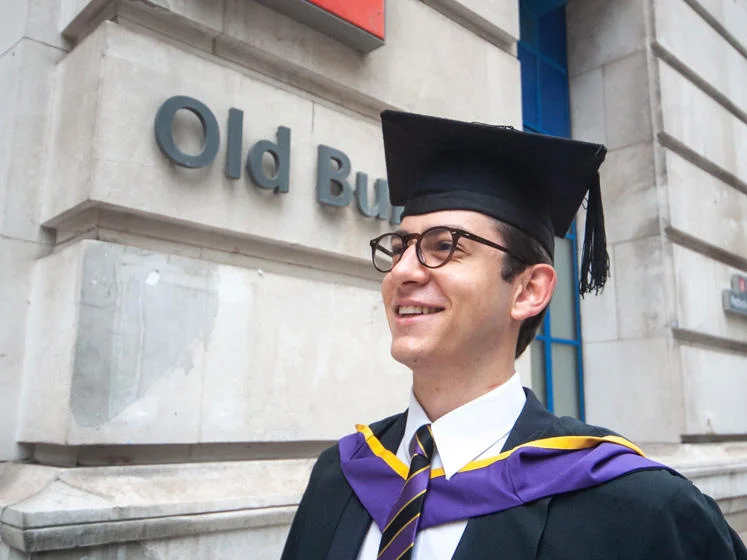Transforming food poverty With digital volunteering

On Thursday 13 February we will be celebrating our annual #GlobalDayOfVolunteering.
This is a day when LSE students, staff and alumni volunteer their time to celebrate how our community helps shape the world through contributing to our communities.
In the lead up to this day, we love hearing stories of how our alumni are creating a better world. We spoke to Fabio Richter, Diana Award recipient, to discuss his work in founding the Hot Meal Challenge.
The Hot Meal Challenge
I founded the Hot Meal Challenge in 2023 to tackle the UK’s cost-of-living crisis, which was threatening the livelihoods of food-insecure families. When food inflation hit a 40-year high of 19% and many people started skipping meals, I found myself wondering how I could use my technology background to address not just hunger, but its deeper social consequences. This question was my starting premise.
The Hot Meal Challenge is a social fundraising campaign raising awareness of the impact of food poverty on people’s mental health and loneliness. To better understand the relationship between food poverty and social isolation, I built a donation app that lets university students nominate their friends to donate hot meals.
Partnering with Sufra, a leading London-based food insecurity charity, allowed us to transfer all the donations and leverage their food supply chains. Together, we wanted to use food as a vehicle to restore human dignity and instill a sense of humanity back into food-insecure individuals. What really mattered to us was the human element. Not just providing hot meals but creating opportunities for people to enjoy them in the company of others.
Making an impact
I designed the Hot Meal Challenge App with the purpose of mobilising others to act as ambassadors for the social cause of food poverty. At the end of the app's donation flow, university students can share their personalised donation awards with one click to their Instagram Stories. In this way, donors can showcase their awards as a badge of honor and a powerful call to action to their friends, demonstrating how they can act to tackle hunger. This sparked a ripple effect of generosity, inspiring a wave of donations and community engagement that extended far beyond the initial campaign.
By combining a unique fundraising approach through modern technology and local grassroots power, we were able to shape a social impact narrative that could easily be adopted by others. Initially, this manifested with students from London-based universities nominating each other to donate, but it quickly grew to include universities across the entire UK. Feeding families across London, the Hot Meal Challenge inspired hope, restored self-dignity, and fostered community for people experiencing food poverty.

Broadening perspectives
Studying at LSE was life changing. My time here challenged me to think differently and broadened my global perspectives by connecting with people from different backgrounds and disciplines. I believe LSE was instrumental in equipping me with the mindset to understand complex social issues and translate that understanding into tangible solutions to improve people's lives.
My Masters in Management and Information Systems was particularly valuable because it united two worlds: the human side of management and the technical aspects of digital innovation. This unique combination allowed me to think systematically about how to leverage technology to effectively address real world problems. At the core, it’s always about real human needs waiting to be served and honored. These insights were invaluable when building the Hot Meal Challenge, as we learned to put human dignity at the centre of every technical decision.
Beyond the classroom, LSE also provided support to put these ideas into practice. Being part of LSE Generate, and its startup accelerator programme was particularly transformative. Through the programme, I received hands-on mentorship, access to successful founders and a community to grow together with. I am very thankful for their generous and early support.
Advice to alumni
I am incredibly proud to honour Princess Diana’s legacy and to have been recognised for this joint effort. The award honours the collective spirit of everyone who contributed, from volunteers, student ambassadors and donors who made sure no one had to face hunger alone. Princess Diana's enduring commitment to compassion and service, serves as a powerful reminder that consistent acts of kindness can inspire lasting change.
My advice to fellow LSE alumni is to start small but stay persistent. Dedicate yourself to a local issue you are emotionally invested in and ask yourself how your lived experiences can inform practical solutions to drive meaningful change. Instead of trying to solve every global challenge simultaneously, focus on how a specific community can benefit from your unique expertise and energy. For me, this meant leveraging my background in technology to tackle the injustice of food poverty. The most important thing is to start. And to start now.
Fabio Richter
MSc Management of Information Systems and Digital Innovation, 2021
If you are interested in taking part in our Global Day of Volunteering, visit our website to find out what's on in London and around the world.
Find out more